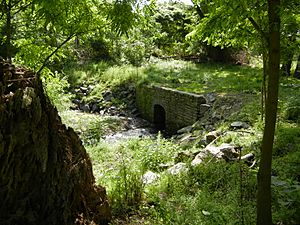Indian Creek (Cobbs Creek tributary) facts for kids
Indian Creek is a small waterway in the Philadelphia area of Pennsylvania, United States. It flows into Cobbs Creek, which is a larger stream. Think of Indian Creek as a smaller "arm" that feeds into a bigger "river."
Contents
What is Indian Creek?
Indian Creek is a natural stream, also called a creek or brook. It helps carry rainwater and groundwater from the land into larger bodies of water. Creeks are important parts of our environment. They provide homes for plants and animals.
Where Does Indian Creek Start?
Indian Creek actually begins as two separate streams, called branches. Both of these branches start in a place called Wynnewood, which is in Montgomery County.
- The West Branch flows through the neighborhood of Penn Wynne.
- The East Branch flows near the Green Hill Condominiums.
Indian Creek's Journey
After starting in Montgomery County, both branches of Indian Creek flow across a road called City Line Avenue. This road marks the border where they enter the city of Philadelphia.
Flowing Through Parks
Once in Philadelphia, both branches flow into a beautiful green space called Morris Park. Near Haverford Avenue, something interesting happens: both streams go underground! They flow through pipes beneath a recreational area in Morris Park.
The two branches then join together underground. The combined Indian Creek comes back to the surface on the south side of Haverford Avenue, close to 69th Street. From there, it flows through more parkland. It also passes through the Cobbs Creek Golf Course.
Joining Cobbs Creek
Finally, Indian Creek meets and joins Cobbs Creek. This happens near the 69th Street Terminal. The meeting point is on the Upper Darby side of Cobbs Creek.
History of Indian Creek
Long ago, Indian Creek was a very busy place. Many factories and mills were built along its banks. These mills used the power of the flowing water to operate machinery. They might have been used to grind grain into flour or to process other materials. This shows how important natural resources like creeks were for early industries.
 | Kyle Baker |
 | Joseph Yoakum |
 | Laura Wheeler Waring |
 | Henry Ossawa Tanner |


